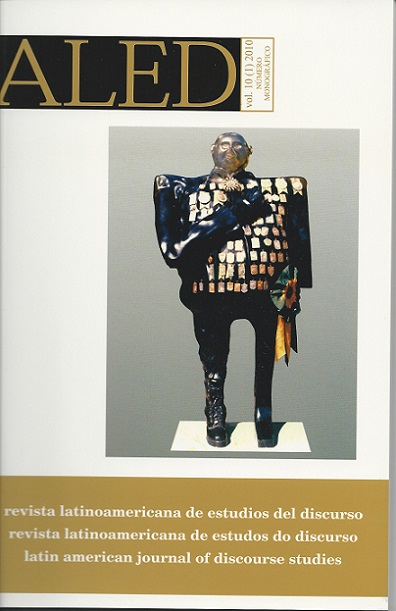Los cubanos en misiones de salud en Venezuela
Referencias contrapuestas y polarizacion discursiva
Keywords:
references. argumentation. discursive polarization.Abstract
The specific purpose of this paper is to examine the meanings created by Venezuelans when they refer to the Cubans who serve in the health care programs initiated under the Cuba-Venezuela Cooperation. These meanings are in line with the stands taken by the two general groups that hold the public scene since 1999, one bringing together the followers of President Hugo Chávez’ policies, and the other one their opponents. The analysis of media texts focuses on the linguistic categories that are used in naming and characterizing the referred entities, and in describing their activities and behaviors as well. The interpretation of the analyzed data is indicative of an important argumentative function of the references used by the text producers. Their particular lexical selections have a decisive role in the construction of polarized meanings in Venezuelan present day socio-political context and thereby hinder the possibilities of dialogue in social interaction.
Downloads
References
Erlich, F. (2005). ‘Características y efectos del discurso autocentrado en Aló Presidente’. Boletín de Lingüística, 24: 3-32.
El Nacional (19 septiembre 2003), S.A. Matasanos importados, p. A6.
Fairclough, N. (1989). Language and power. Londres: Longman.
Fairclough, N. (1995). Critical Discourse Analysis. The Critical Study of Language. Londres y New York: Longman.
Kerdel, F. 15/3/2006 http://www.analítica.com/va/sociedad/artículos/2491498.asp; recuperado 30/3/2009).
Johnstone, B. (2002). Discourse Analysis. Malden, Mass y Oxford: Blackwell.
Plantin, C. (1998). La argumentación. Barcelona: Ariel.
Plantin, C. (1999). ‘La interacción argumentativa’. Escritos 17/18: 23-49.
Saussure, F. de (1972). Cours de linguistique générale. París: Payot.
Valdés Villanueva, L.M. (2000). La búsqueda del significado. Lecturas de filosofía del lenguaje. Madrid: Editorial Tecnos.
van dijk, t. (1991). Racism and the press. Routledge: London/New York.
van dijk, T. (1996). ‘Análisis del diálogo ideológico’. Versión. Estudios de Comunicación y Política 6: 15-43.
van dijk, T. (1999). Ideología. Una aproximación multidisciplinaria. Barcelona: Gedisa.
Downloads
Published
How to Cite
Issue
Section
License

This work is licensed under a Creative Commons Attribution-NonCommercial-NoDerivatives 4.0 International License.
The authors retain the copyright and guarantee RALED the right to be the first publication of the work as well as a Creative Commons Attribution License that allows others to share the work with recognition of authorship and the initial publication in this journal.




